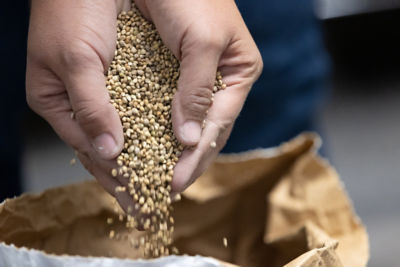Hammerhead Explained: Answers to Your Top Questions
1. What are root-knot nematodes, and why are they harmful to pepper crops?
Root-knot nematodes are microscopic roundworms that live in the soil and parasitize plant roots. This group of nematodes are often the most widespread and destructive plant parasitic nematode in vegetable crops. Root-knot nematodes pierce the plant root using a specialized, needle-like mouth part called a stylet, and feeds directly on the root cell. This type of injury harms pepper plants by limiting the amount of water and nutrients the plant can uptake. The physical wounding from nematode feeding also makes the plant more susceptible to other soilborne plant diseases caused by fungi and bacteria.
2. How does Hammerhead’s built-in natural resistance specifically target parasitic nematodes without affecting beneficial nematodes in the soil?
The resistance trait in Hammerhead is very specific and is effective against key species of root-knot nematode, Meloidogyne incognita, M. arenaria, and M. javanica. The resistance in the pepper is a natural reaction. When one of these nematode species pierces the plant root of a resistant variety, like Hammerhead, the plant is able to recognize this intrusion and initiate very specific plant defense responses at the pierce site. This has shown to result in the nematode not being able to establish a feeding site, further damage the plant or to reproduce. The plant is essentially depriving the parasitic nematodes of food. This natural resistance does not affect beneficial nematodes, as they do not feed on the plant, and they are not deprived of their food source.
3. Can you explain how Hammerhead supports overall soil health while combating harmful nematodes?
Growing resistant varieties, like Hammerhead, has shown effective control of targeted pests while helping to reduce or eliminate the need to use fumigants targeted to address the presence of parasitic nematodes. Since nematode resistance is specific only to the plant pathogenic species being targeted, a reduction in nematode fumigation allows for beneficial nematodes in the soil to flourish. It should be noted that Hammerhead is resistant only to Meloidogyne incognita, M. arenaria, and M. javanica nematode species. The presence of other parasitic nematode species may require the application of fumigants to address the presence of other nematode species.
4. What makes Hammerhead's approach different from chemical treatments that might impact soil organisms?
Many chemical or fumigate treatments being used today for nematode control are broad spectrum that may adversely affect species diversity and abundance of beneficial fungi, bacteria, and nematode species in the soil. Hammerhead’s approach is specific in that it targets and affects only three plant parasitic nematode species, Meloidogyne incognita, M. arenaria, and M. javanica.
5. Are there any long-term benefits to using Hammerhead peppers for soil and plant health compared to traditional pepper varieties that do not have the resistance?
Three years of Bayer internal trials have shown that consistent use of a root-knot nematode resistant pepper, like Hammerhead, can significantly reduce the number of these plant parasitic species in the soil over time. Not only does this benefit the resistant pepper from additional damage, but lowering the population of these parasitic species in the soil also benefits the health of future crops (resistant or not) planted in the same area.
6. How does the natural resistance mechanism of Hammerhead interact with other components of a balanced soil ecosystem?
The resistance mechanism of Hammerhead, in itself, does not directly interact with other components of a balanced soil ecosystem. What Hammerhead has shown though, is a reduction in applications of broad scale fumigation for nematode control which can negatively impact the health, diversity, and balance of the soil ecosystem. For example, utilizing Hammerhead’s natural resistance in place of fumigation, has shown to promote a healthier soil microbiome by allowing the presence of beneficial nematodes.
7. Could the use of Hammerhead peppers contribute to sustainable farming practices and improved soil biodiversity over time?
Proper management and control of root-knot nematodes is imperative for the production of many vegetable crops, including peppers. The development of resistant varieties is critical to the future of sustainable farming as we seek to grow more food with less inputs. A healthy soil is fundamental to meeting this challenge. New innovations such as the root-knot nematode resistance in Hammerhead have shown the potential to provide farmers options to combatting pest problems in a way that is often more effective, and less disruptive of the soil biodiversity.
8. What would you say is the biggest advantage for farmers to plant Hammerhead in their fields?
There are three major advantages for farmers to plant Hammerhead in their fields, each potentially as important as the other.
1) Root-knot nematode resistance in Hammerhead provides effective control of the target pest.
2) Utilizing the resistance in Hammerhead has shown to be cost effective relative to fumigation treatments.
3) Hammerhead may provide for a reduction of certain chemical fumigant treatments to address the presence of Meloidogyne incognita, M. arenaria, and M. javanica which has shown improved soil health metrics.



